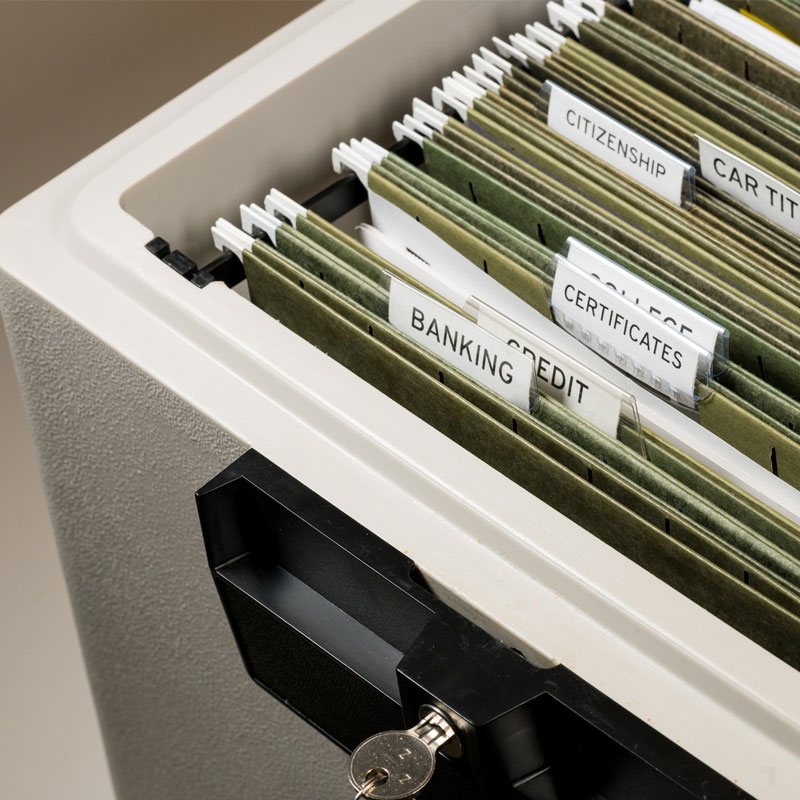A checklist is a great way to begin taking steps to protect yourself as you begin the process of divorce. When you or your spouse file for divorce, there are several steps you should take.
This may include:
- Income, financial, and employment documents
- Bank, insurance, and investment statements
- Estate planning documents
- Credit card and student loan statements
- Documents for child-care costs
Ensuring that your data and online accounts are protected from your spouse is an important step, especially if your spouse has a history of using information against you. Information shared via email, social media, and other online methods is considered by some to be less consequential. However, this is not the case. This information could all be used in court and affect the outcome of your case.

If your spouse has access to any of your accounts, whether email or social media, they could be able to fabricate information or otherwise use that access to harm you. A divorce attorney can help you understand what information may be used against you in court. Working with an attorney can help in many ways throughout the process of divorce.
Arizona Divorce Checklist
There are several practical steps to take at the beginning of an Arizona divorce case to protect you, your financial future, and the outcome of a divorce case.
Soon after divorce is filed, you should begin separating your personal life from your spouse’s. There are several changes you should make in your life during this time.
Passwords and Security Questions
If your spouse knows passwords to your accounts or has access to your accounts, they have access to a great deal of information. Change all your passwords, and ensure they are secure. Then, create new passwords that your spouse would not be aware of or be able to guess. Otherwise, your spouse may have access to financial statements, your communication with attorneys and other professionals, and similarly sensitive information. Even seemingly innocuous accounts may provide your spouse with significant information or the ability to harass you.

Log out of your accounts on all devices that your spouse may have access to. This includes devices that your children use. If your login is saved on a device your children take to your spouse’s home, they could gain access to your account. Many accounts have a setting that allows you to log out of all devices, preventing a former spouse from accessing it.
You will also want to enable two-factor authentication. This creates a secondary confirmation method necessary to allow access to your account. If your spouse tries to log into your account and knows or guesses the password, the second authorization request will be sent to your phone number or email, preventing access.
For certain situations where your spouse is especially combative or spiteful, changing your password may be insufficient. If your spouse knows the answers to your security questions, they may be able to gain access to your accounts that way. If possible, use security questions that your spouse won’t know the answer to. Or, create inaccurate answers to security questions that you’ll remember but your spouse won’t be able to find out.
Spending Habits
A divorce is never financially easy. There is a financial cost to the process itself, including attorneys and court fees, which can increase if you enter litigation. Even beyond legal fees, divorce leaves you with less income and more expenses. This change in living expenses can have serious consequences for one or both spouses.
If you begin budgeting and planning ahead, you may be better equipped to adjust. Budget your financial future, and limit unnecessary expenses. Divorce not only lessens your income and increases your expenses, but it may impact you in other ways. For example, as a married couple, you may have had discounts on health insurance, cell phone plans, and other expenses. Budget for these changes and document other changes. This is important financial information when determining spousal support and child support during divorce.
Stress and Emotional Management
A divorce can have a significant impact on your stress levels, your physical health, and your mental and emotional health. Ignoring this crucial part of your health could harm the outcome of your divorce case. Be sure to have people you can confide in, whether that is a friend, family member, professional therapist, or counselor. Divorce is an incredibly stressful time in anyone’s life, and it’s essential to have support and learn how to cope with the situation.

Some useful skills include:
- Scheduling your time – You will have legal meetings and negotiations and eventually may have court proceedings. Schedule time between these events to prepare, handle your day-to-day life, and relax.
- Ask for help – Your friends, family, and community can help with certain tasks, maintenance, or transportation needs.
- Consider support groups – You are not the only person dealing with the process or aftermath of divorce. It can be cathartic to talk with those dealing with the same time management stressors, financial issues, and legal complications as you.
Cell Phone Plan
If you and your spouse have a shared cell phone plan, the beginning of your divorce is the time to change that. A spouse on the same phone plan may be able to access communications on your phone. This could include communication with your attorney or financial planners. If necessary, you could change your phone number or provider for extra security.
Many people may find it difficult to change a phone plan for financial and logistical reasons. However, in addition to security concerns, being on the same cell phone plan can make it hard to separate yourself from your relationship and move on with your future life. Though it may seem easier, it can cause complications during a divorce. If your phone provider issues a fee for early termination, try to split that fee with your spouse. Even if they don’t agree, paying the fee yourself is preferable to your spouse continuing to have access to your call history and communications.
Mail Preview Services
The USPS has an informed delivery service, which allows you to receive emails about what you’re getting in the mail, along with images of the mail. This is a useful service for those who travel or individuals who receive misdirected mail often. It is also vital so you can ensure you’re receiving all mail addressed to you.
However, if both you and your spouse receive those emails, this can lead to issues during divorce. If your spouse is no longer living at the same address, and you’re staying in the home you shared together, your spouse can see all the mail you’re receiving. You can cancel the informed delivery service or remove your spouse from the delivery email online or through customer service.
Location Sharing
Here are some to consider:
- Cell phone location sharing – You and your spouse may have actively shared locations during your marriage. If that feature is still active, turn it off. You can even turn off your phone’s location services.
- Social media location posts – Pictures of yourself in clearly identifiable locations may be a danger. If you are posting pictures in fancy locations or on vacation, your spouse may even use that to prove you don’t need a certain level of spousal support.
- Location-sharing apps – There are several apps that allow friends to follow each other and find their locations, and there are family tracking apps. You can either take yourself off these apps and uninstall them or remove your spouse and their close friends from the list of people who can see your location.
- Lost phone tracking apps – There are several apps made to find your cell phone if you lose it. Ensure that your spouse does not have access to these accounts.
- Social media location tracking – Most social media apps have location settings. Be sure to disable those for extra security.

Social Media
Over the duration of your divorce and divorce proceedings, try to limit your social media use. At a minimum, you should unfollow or even block your spouse on social media sites to limit interactions and conflict.
A divorce is a smart time to log off social media. Be careful what you share during this time because anything you say or share can be used against you. Your social media presence may be used to prove that you are not a responsible parent and shouldn’t be provided with custody. It may also be used to show that your lifestyle is expensive and you don’t need spousal support or child support payments. In severe cases, it could prove that you lied under oath and committed perjury during divorce proceedings.
However, despite that severity, it’s important not to delete your accounts during this time. Information and posts on these accounts may be subject to court discovery. Deleting accounts or posts may be considered destruction of evidence. Don’t delete your accounts, but comb through your accounts for potentially damaging information and share that with your attorney.
Shared Accounts
If you have a joint email account with your spouse, be sure to create your own separate account. Have all important communications through this personal account, and ensure that your spouse can’t access it. Cease or limit the information that is sent to the joint account, particularly financial information.
When it comes to joint bank accounts, it’s important to be careful. Altering marital accounts or preventing your spouse from accessing them is a bad idea, as the contents legally belong to both of you. Discuss your options with your attorney regarding joint bank accounts. In most situations, joint bank accounts must remain as they are throughout divorce proceedings. Until then, create or use personal checking and savings accounts, and open a credit card that is only in your name. Monitor your credit closely in case your spouse tries to open credit cards in your name to harm your credit score.
Online Accounts
As part of changing passwords and securing your accounts, ensure that you have a list of all your important accounts. If you forget about important accounts like utility accounts, a spiteful spouse may leverage this and prevent you from paying essential bills. Do your best to cover and catalog accounts that need protecting.

This includes accounts such as:
- Personal credit cards
- Retirement accounts
- Personal savings and bank accounts
- Streaming services
- Online shopping services
- Utility bill payment accounts
Seek Help During an AZ Separation or Divorce
Divorce becomes significantly more complicated with social media and an online presence. It’s important to plan for a life separate from your spouse financially, physically, and emotionally. Be ready to plan your financial future without your spouse, and protect your cybersecurity during divorce proceedings.
Working with an experienced divorce attorney at The Valley Law Group can help safeguard you against privacy breaches and cover all aspects of your security. If your spouse has already begun altering passwords or accessing your personal information, you need to contact top Arizona divorce attorneys at The Valley Law Group as soon as possible. We can help you mitigate damages and take legal action.

Jonathan Roeder, Founder/Director of Marketing of The Valley Law Group, is an Arizona native who has dedicated his life and career to the service of others. After graduating salutatorian of his high school class, Jonathan attended beautiful and prestigious Pepperdine University, where he majored in Political Science. During his tenure at Pepperdine University, his passion for helping others grew after securing a clinical position with a residential treatment center for juveniles with substance addictions. Post-graduation, Jonathan returned to Arizona and served as a residential manager for mentally and physically disabled homes.

